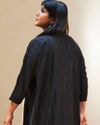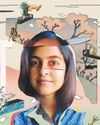Facing bullying, confusion and loneliness as a young gay man in India had become a routine occurrence for him. But Vivek Tejuja found comfort in the pages of books — many of which formed the foundation of his relationships. He looks back at the literature that gave him the courage to embrace his identity.

When you are different and need to know more about who you are, what do you do? Where do you find solace and comfort? And who decides you are different? Actually, I never felt ‘different’ until the world around me started making me feel that way. Gay. Homo. Faggot. Sissy. These terms were used liberally when I would walk into my school playground, when I would eat lunch alone, when I was simply living, like any other teenager. And then I discovered one place where I felt safe — the school library. That’s where is all began.
Thankfully, my mother introduced us to books at a very early age. Five, in my case and I knew I would not be alone for a single day in my life, as long as I read. But as I became older, I learnt that there were very few books about the ‘Indian LGBTQIA scene’ so to say. Yes, there was literature around it but most of it came from outside of India.
Internet came later and with it, of course horizons widened, and we got around to reading about us — the ‘other’ placed in a culture we recognised, a place we were born and raised in — and it was the most gratifying thing to be aware and to know that there are people such as yourself in the world — to acknowledge other identities and learn to be welcoming of all, no matter what.
The first Indian LGBTQIA literature I chanced upon at that time — I think it was 1999 — was Lihaaf by Ismat Chughtai. It was one of the most monumental reads of my life — even though it spoke of two women. But knowing that she wrote it in 1942 — a time when one couldn’t imagine two people of the same sex being together, Lihaaf was an introduction like no other. The story compelled and propelled me to read more. The search began.
هذه القصة مأخوذة من طبعة October 2018 من Verve.
ابدأ النسخة التجريبية المجانية من Magzter GOLD لمدة 7 أيام للوصول إلى آلاف القصص المتميزة المنسقة وأكثر من 9,000 مجلة وصحيفة.
بالفعل مشترك ? تسجيل الدخول
هذه القصة مأخوذة من طبعة October 2018 من Verve.
ابدأ النسخة التجريبية المجانية من Magzter GOLD لمدة 7 أيام للوصول إلى آلاف القصص المتميزة المنسقة وأكثر من 9,000 مجلة وصحيفة.
بالفعل مشترك? تسجيل الدخول

Making Amends
This generation’s penchant for thoughtless consumption gets Madhu Jain roiled up, and she wonders if nature is getting its own back for our missteps…

Diamonds With Provenance
In keeping with the company’s commitment to environmental and social responsibility, Anisa Kamadoli Costa, chief sustainability officer at Tiffany & Co. and chairman and president at The Tiffany & Co. Foundation, enlightens Shirin Mehta on the efforts that make the jewellery giant an industry leader in transparency

SARTORIAL ECONOMICS
Sisters Tashi and Tara Mitra demonstrate to Akanksha Pandey how deviating from the mainstream can bend the way we think, live and dress

NOTES TO SELF
An anthropomorphized tiger’s perspective, a viscerally worded futuristic interpretation of loss, a critique of performative activism, a meta reflection on the earth’s crises. Told through different lenses, Janaki Lenin, Indrapramit Das, Keshava Guha and Roshan Ali’s stories — written exclusively for Verve — attempt to make sense of the fraught reality that we exist in today

The Eternal Optimist
As Generation X and xennials grapple with fully transitioning to conscious living, young millennials and Generation Z are leading the charge to reverse human-caused environmental damage. Sahar Mansoor, founder and CEO of the Bengaluru-based zero-waste social enterprise Bare Necessities, has a simple overarching philosophy: consume less and stay positive. Verve gets deeper into the mindset of the action-oriented earth advocate

Redemption SONGS
Indian music festivals have been demonstrating a refreshing sense of responsibility in terms of their ecological impact. Interacting with stakeholders who strive to make these large-scale events greener, Akhil Sood investigates the reasons behind the improved attitudes of audiences and the increase in corporate support.

earth hour
Crafted using nature’s elements, these dials draw inspiration from the many heterogeneous materials and hues around us.Verve turns its lens onto a mesmerising few

THE KIDS ARE ALL RIGHT
Children are holding adults accountable for both the grim future they are facing and the toll this is taking on their mental health. Madhumita Bhattacharyya initiates conversations with families of young climate activists and observes the extent to which parenting has changed in the face of catastrophe

NATURAL JUSTICE
Most of us are only just waking up to the urgency of climatic action. When the stakes are so high, what can individual action solve? Mridula Mary Paul, an environmental policy expert, is proof of the tenacity needed to effect systemic change. It’s not glamorous, and the rewards are few and far between, but that doesn’t stop her from aiming big, finds Anandita Bhalerao

Along For The Ride
Navigating Indian streets as a woman is hard enough. But what is it like while riding a bicycle? Bengaluru-based Shreya Dasgupta, a regular cyclist, speaks to five urban women about the pros and cons of this increasingly popular means of transport.